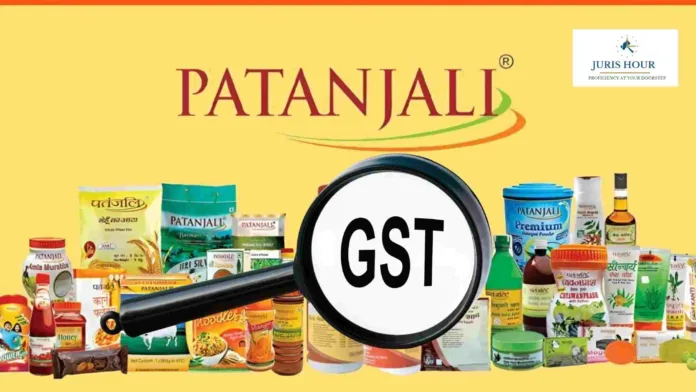The Supreme Court put on hold the recovery of a Rs. 273.5 crore penalty imposed on Patanjali Ayurved Limited under the Goods and Services Tax (GST) regime, while deciding to examine the company’s challenge to an Allahabad High Court judgment that had upheld the levy.
The Bench of Justice P.S. Narasimha and Justice A.S. Chandurkar issued notices to the Union of India and the Directorate General of GST Intelligence (DGGI), seeking their response to Patanjali’s appeal. The Court ordered that the penalty would remain stayed until further directions.
Background of the Case
The controversy dates back to an investigation by the DGGI into Patanjali’s transactions. Authorities claimed they had received intelligence inputs suggesting that the company was linked to entities with unusually high utilisation of Input Tax Credit (ITC) despite having no income tax records.
According to the DGGI, Patanjali allegedly acted as the “main person” in a network engaged in circular trading — the issuance of tax invoices without any actual supply of goods — resulting in wrongful availment and transfer of ITC.
On April 19, 2024, the DGGI issued a show cause notice proposing a penalty of ₹273.51 crore under Section 122(1)(ii) and (vii) of the Central Goods and Services Tax Act, 2017 (CGST Act).
Mixed Findings at the Adjudication Stage
In an adjudication order dated January 10, 2025, the tax authorities dropped demands raised under Section 74 of the CGST Act. The order noted that, for all products, Patanjali’s sales quantities exceeded purchase quantities from suppliers, and all availed ITC had been duly passed on.
However, the department continued to pursue penalties under Section 122, arguing that such proceedings were independent of any tax demand under Section 74.
Patanjali’s Legal Challenge
Patanjali approached the Allahabad High Court, contending that penalties under Section 122 were criminal in nature and could only be imposed after a trial before a criminal court, not by departmental officers. The company further argued that once Section 74 proceedings were dropped, the penalty could not stand.
On May 29, 2025, a division bench of Justice Shekhar B. Saraf and Justice Vipin Chandra Dixit dismissed the plea. The High Court held that penalties under Section 122 are civil liabilities and can be adjudicated by GST officers. Dropping of Section 74 proceedings does not automatically end Section 122 proceedings, as the two address different types of contraventions. Under Explanation 1(ii) to Section 74 and Rule 142(1)(a) of the CGST Rules, proper officers are empowered to issue notices and adjudicate penalties.
The High Court relied on the Supreme Court’s precedent in Gujarat Travancore Agency, which distinguished between civil tax liabilities and criminal penalties.
Supreme Court Proceedings
Dissatisfied with the High Court ruling, Patanjali filed an appeal in the Supreme Court, raising substantial questions on the true nature of penalties under Section 122 (civil vs. criminal). The jurisdiction of GST officers to impose such penalties. The effect of quashing associated tax demands under Section 74.
During the hearing, the apex court issued notice to the Union Government and the DGGI, and ordered that the penalty recovery process be halted until further orders.
The case is expected to clarify the scope and application of penalty provisions under the GST framework, with significant implications for other businesses facing similar proceedings.
Read More: Improve GSTN Portal: AGFTC & ITBA to Finance Minister Nirmala Sitharaman

